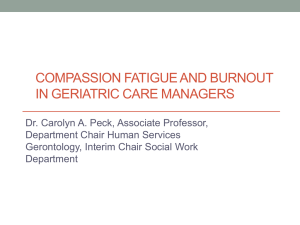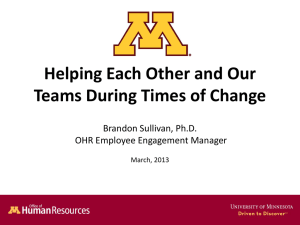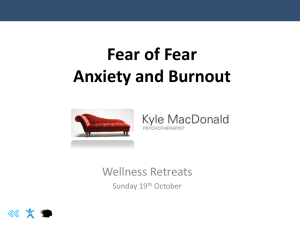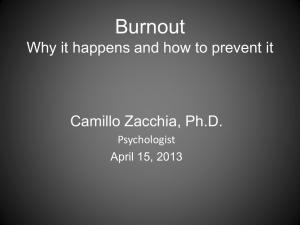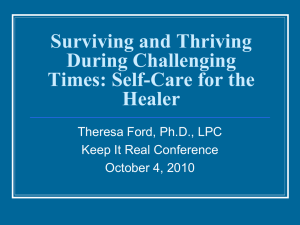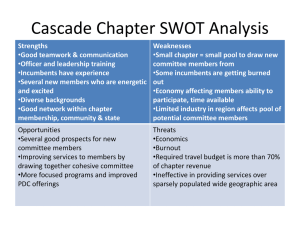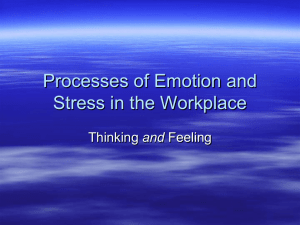Original Article JOURNAL OF GYNECOLOGY ASSOCIATION OF
advertisement
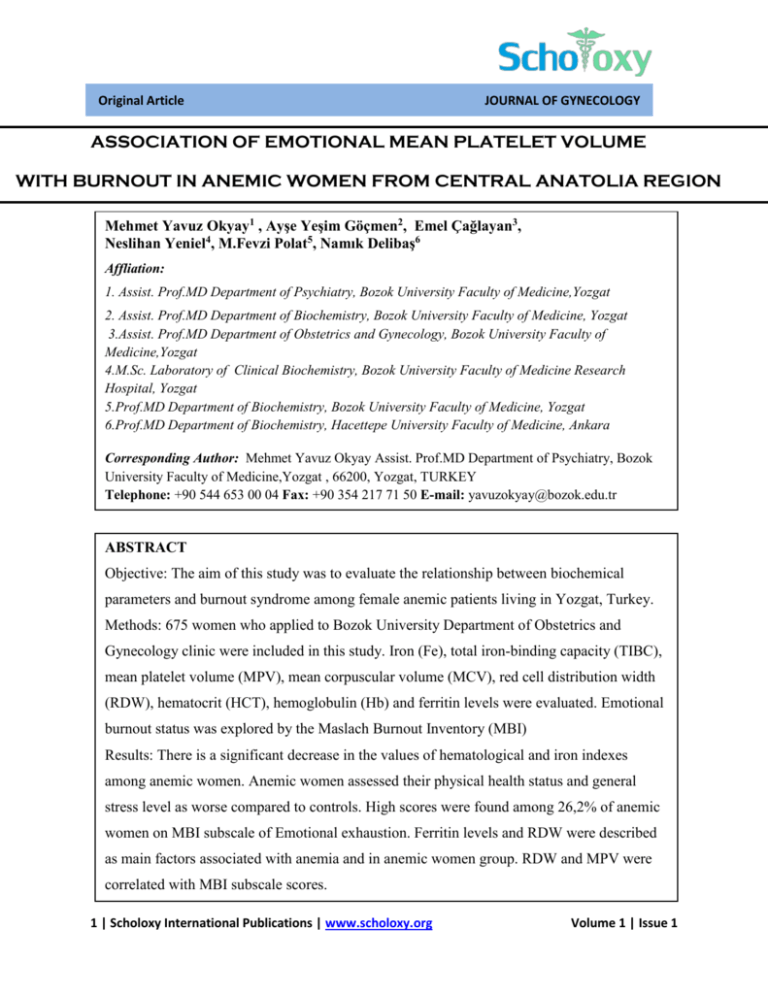
Original Article JOURNAL OF GYNECOLOGY ASSOCIATION OF EMOTIONAL MEAN PLATELET VOLUME WITH BURNOUT IN ANEMIC WOMEN FROM CENTRAL ANATOLIA REGION Mehmet Yavuz Okyay1 , Ayşe Yeşim Göçmen2, Emel Çağlayan3, Neslihan Yeniel4, M.Fevzi Polat5, Namık Delibaş6 Affliation: 1. Assist. Prof.MD Department of Psychiatry, Bozok University Faculty of Medicine,Yozgat 2. Assist. Prof.MD Department of Biochemistry, Bozok University Faculty of Medicine, Yozgat 3.Assist. Prof.MD Department of Obstetrics and Gynecology, Bozok University Faculty of Medicine,Yozgat 4.M.Sc. Laboratory of Clinical Biochemistry, Bozok University Faculty of Medicine Research Hospital, Yozgat 5.Prof.MD Department of Biochemistry, Bozok University Faculty of Medicine, Yozgat 6.Prof.MD Department of Biochemistry, Hacettepe University Faculty of Medicine, Ankara Corresponding Author: Mehmet Yavuz Okyay Assist. Prof.MD Department of Psychiatry, Bozok University Faculty of Medicine,Yozgat , 66200, Yozgat, TURKEY Telephone: +90 544 653 00 04 Fax: +90 354 217 71 50 E-mail: yavuzokyay@bozok.edu.tr ABSTRACT Objective: The aim of this study was to evaluate the relationship between biochemical parameters and burnout syndrome among female anemic patients living in Yozgat, Turkey. Methods: 675 women who applied to Bozok University Department of Obstetrics and Gynecology clinic were included in this study. Iron (Fe), total iron-binding capacity (TIBC), mean platelet volume (MPV), mean corpuscular volume (MCV), red cell distribution width (RDW), hematocrit (HCT), hemoglobulin (Hb) and ferritin levels were evaluated. Emotional burnout status was explored by the Maslach Burnout Inventory (MBI) Results: There is a significant decrease in the values of hematological and iron indexes among anemic women. Anemic women assessed their physical health status and general stress level as worse compared to controls. High scores were found among 26,2% of anemic women on MBI subscale of Emotional exhaustion. Ferritin levels and RDW were described as main factors associated with anemia and in anemic women group. RDW and MPV were correlated with MBI subscale scores. 1 | Scholoxy International Publications | www.scholoxy.org Volume 1 | Issue 1 Conclusions: Determination of MPV and RDW values is relatively easy and inexpensive method requiring small amount of blood for the diagnosis of anemia. RDW and MPV values might be taken into account for the prevention of emotional distress, with special concern to psychiatric treatments along with their primary anemia anemic women who manifested high vulnerability.therapy. Key words: Emotional burnout, anemia, mean platelet volume, red cell distribution width INTRODUCTION Prolonged stress leads to a loss of energy and exhaustion which gives rise burnout that is associated psychiatric treatments along with their primary anemia therapy. with a lack of motivation and increased feelings of According to some publications, it is not clear whether disparagement and cynicism [1]. Burnout is a or not burnout syndrome is associated with the poor syndrome of depersonalization, emotional exhaustion quality and a sense of low personal accomplishment [2]. depression and fatigue in people suffering from People with anemia is a condition do not have enough red blood cells in blood [3]. Anemia is typically diagnosed on a complete blood count. In modern whole blood counters, four parameters (red blood cell (RBC) count, hemoglobin concentration, white blood cell (WBC) and platelets) are measured, allowing of life, especially physical functioning, haematological malignancies. Therefore, the main goal of this study was to evaluate relationship between biochemical parameters and burnout syndrome among female anemic patients living in central Anatolia region. Methods others (hematocrit, mean platelet volume (MPV), mean corpuscular volume (MCV), red cell distribution The study included 675 women who applied to Bozok width and mean University Department of Obstetrics and Gynecology and mean clinics. The patients were between the ages of 18-45 corpuscular hemoglobin concentration (MCHC)) to be and not receiving anemia treatment. The exclusion calculated [3]. Increase at RDW levels mainly due to criteria were; pregnancy, any medication use and anemia associated with nutritional deficiencies, and in acute-chronic disease history besides from anemia. (RDW), corpuscular hematocrit hemoglobin (HCT) (MCH) particular the first finding of iron deficiency anemia [4]. Iron (Fe), total iron-binding capacity (TIBC) and ferritin The test of MPV is an indicator of platelet size. The levels were measured immunoturbidimetrically using increase in the value of MPV means increased mean commercial kits on COBAS platelet diameter leading to increased synthesis of Diagnostics, Mannheim, Germany). Complete blood new platelets at bone marrow. MPV test is often used count analysis was analyzed using CELL-DYN 3700 for the differential diagnosis of thrombocytopenia [5] hematology analyzer (Abbott and generally remain unchanged in anemia. Park, Illinois, USA) as a part of routine preoperative Integra® (Roche Laboratories, Abbott blood sampling. Mean platelet volume (MPV), mean In many countries as well as Turkey, anemia is corpuscular volume (MCV), red cell distribution width common among the females [6]. Especially female (RDW), hematocrit (HCT) and mean corpuscular patients hemoglobin assume that their emotional burnout (MCH) and mean corpuscular symptoms are due to emotional status due to work hemoglobin concentration (MCHC) were calculated by rather than any physiological disorder like anemia. autoanalyser. The neutrophil and lymphocyte counts This condition leads to under-diagnose of burnout were recorded and the Blood neutrophil-to- syndrome among these patients and lack of additional 2 | Scholoxy International Publications | www.scholoxy.org Volume 1 | Issue 1 lymphocyte (N/L) ratio were manually calculated from anemic these parameters. correlated with MBI subscale scores. women group; RDW and MPV were An anonymous questionnaire which included; socio- Discussion demographic data and self-reported health status Burnout is a prolonged response to chronic emotional applied to the patient group. and interpersonal stressors and is defined by the three dimensions of exhaustion, cynicism, and Emotional burnout status was explored by the Maslach Burnout Inventory (MBI) [7]. The Maslach Burnout Inventory (MBI) is a 22-item,7-level Likert scale. The MBI comprises of three subscales; emotional exhaustion,tendency others,diminished feelings to depersonalize of personal accomplishment in working with others. SPSS 18.0 package program was used for data analysis. ANOVA test was performed for parameters inefficacy [8]. The purpose of this study was to identify relationship between biochemical parameters and burnout syndrome among female anemic patients. In general burnout research, the results with respect to gender are inconsistent. Some studies report a high degree of burnout among women, while others show that men are more often affected [9]. In the literature, there are conflicting data concerning the correlation between burnout and other variables, such as consistent with the normal distribution and the Mann- demographic and occupational factors and methods Whitney U test was performed for parameters not are quite heterogeneous [10]. consistent with the normal distribution. “Backward High burnout, lead to feeling of worthlessness, stepwise" method of analysis was preferred to show unmotivated, the independent effect of the variable. Pearson and dissatisfaction with work and consequently lead to decrease in career self concept. Spearman tests were used for correlation analysis.”p- Negative feelings of people with a high burnout level values” less than 0.05 was considered to be are related to loss of a sense of their professional statistically significant. activity, loss of ability to self-realization, loss of personal perspective. As the result of being in such a Results The study population and evaluated parameters in the anemia and burnout groups are described in (Table 1).The study was explained to the participants and an informed consent was given by each one. Every patient was subjected to detailed history taking; demographic data, history of present condition, past history and psychiatric history. According to our results; we observed decrease in the values of hematological and iron indexes in the anemic women group as expected. Anemic women group assessed their physical health status and general stress level as worse compared to controls (p<0.001). High scores were found among 26,2% of anemic women on MBI subscale of Emotional condition for a long time a person loses the ability to enjoy life, loses all or nearly all that has been the basis for him/her. A burnout syndrome also causes physical and mental disorders. People having psychopathological, this problem psychosomatic, reveal somatic symptoms and symptoms of social dysfunction. They have chronic (dysfunction of tiredness, memory cognitive and dysfunction attention), sleep disorders due to difficulties to sleep and early awakening, personality disorders. These people can develop depression, psychoactive substance dependence, can commit a suicide. The general somatic symptoms are headache, gastrointestinal disorders cardiovascular disorders [11]. exhaustion. RDW and ferritin levels were described as main factors associated with anemia. In the 3 | Scholoxy International Publications | www.scholoxy.org Volume 1 | Issue 1 The current research examined the demonstrated relationship between burnout and RDW and MPV values. Determination of MPV and RDW values is relatively easy and inexpensive method for the diagnosis of anemia. The relationship between depression and increased platelet activity has been previously stated by several studies [11, 12]. The originality of our study stands in the combination of a validated and widely accepted questionnaire (the MBI) and quantitative biochemical measurements. Conclusion As a conclusion RDW and MPV (an indicator of platelet activity) values might be taken into account for the prevention of emotional distress, with special concern to anemic women who manifested high vulnerability to burnout syndrome. Future research should investigate the effect of emotional burnout on MPV and RDW levels. Disclosure The authors report no conflict of interest. The authors alone are responsible for the content and writing of the paper. 4 | Scholoxy International Publications | www.scholoxy.org Volume 1 | Issue 1 TABLE 1: COMPARISON OF VARIOUS PARAMETERS AMONG THE STUDY GROUPS N=675 Group A Group B Group C Group D Anemia (-) Anemia (-) Anemia (+) Anemia (+) Burnout (-) Burnout (+) Burnout (-) Burnout (+) N=86 N=161 N=80 N=348 Hemoglobin (g/dl) 12.75 ± 1.16 12.01 ± 1.11 9.73 ± 2.16b 9.15± 2.13 HCT (%) 38.87 ± 3.60 36.47 ± 3.00 30.53 ± 5.84b 30.13 ± 5.34 MCV (fl) 80.19 ± 5.32 78.49 ± 5.00 64.60 ± 7.87b 62.60 ± 7.66 MCH (pg) 26.12 ± 4.23 25.52 ± 3.98 19.95 ± 3.97b 19.63 ± 3.05 MCHC (g/dl) 33.21 ± 1.54 32.21 ± 1.33 31.20 ± 2.73 30.20 ± 2.87 RDW (%) 13.81 ± 1.01 15.81 ± 1.34a 16.84 ± 2.68b 18.12 ± 3.22c Platelet (x109/L) 350.29 ± 130.04 380.29 ± 121.13 392.04 ± 168.36 402.04 ± 168.18 Leukocyte (x 109/L) 9.53 ± 4.98 9.67 ± 4.18 11.39 ± 5.55 13.76 ± 5.34 Neutrophil (x 109/L) 3.98 ± 2.16 4.97± 2.76 5.39 ± 3.88 5.87 ± 3.23 MPV (fl) 8.00 ± 0.75 9.36 ± 1.45a 7.91 ± 0.48 9.49 ± 0.67c Iron (μg/dl) 466.95 ± 92.43 448.35 ± 90.55 327.86 ± 53.79b 314.31 ± 50.56 TIBC (μg/dl) 73.73 ± 16.92 56.36 ± 16.01 49.80 ± 11.75b 59.80 ± 11.60 Ferritin (μg/ml) 42.7 ± 15.6 44.7 ± 15.12 22.7 ± 13.6b 20.7 ± 13.43 MBI 1.7 ± 0.6 4.3 ± 1.08* 2.1 ± 0.6 5.20 ± 1.26c The values are expreed as mean ± STD. HCT hematocrit, MCV mean corpuscular volume, MCH mean corpuscular hemoglobin, MCHC mean corpuscular hemoglobin concentration, RDW redcell distribution width, MPV mean platelet volume, TIBC total ironbinding capacity, MBI Maslach Burnout Inventory a p<0.05 between Group A and Group B b p<0.05 between Group C and Group A c p<0.05 between Group D and Group C 5 | Scholoxy International Publications | www.scholoxy.org Volume 1 | Issue 1 References population: the MELEN study. J Psychiatr Res. 2012 1.Jordan K, Fenwick J, Slavin V, Sidebotham M, Gamble J. Mar;46(3):298-302. Level of burnout in a small population of Australian 12.Ataoglu A, Canan F. Mean platelet volume in patients midwives. Women Birth. 2013 Jun;26(2):125-32. with major depression: effect of escitalopram treatment. J 2.Panagopoulou E, Montgomery A, Benos A. Burnout in Clin Psychopharmacol. 2009 Aug;29(4):368-71. internal medicine physicians: Differences between residents and specialists. Eur J Intern Med. 2006 May;17(3):195-200. 3.Sacirovic S, Asotic J, Maksimovic R, Radevic B, Muric B, Mekic H, et al. Monitoring and Prevention of Anemia Relying on Nutrition and Environmental Conditions in Sports. Mater Sociomed. 2013;25(2):136-9. 4.Urrechaga E, Aguirre U, Izquierdo S. Multivariable Discriminant Analysis for the Differential Diagnosis of Microcytic Anemia. Anemia. 2013;2013:457834. 5.Noris P, Klersy C, Gresele P, Giona F, Giordano P, Minuz P, et al. Platelet size for distinguishing between inherited thrombocytopenias multicentric, real and life immune study. Br thrombocytopenia: J Haematol. a 2013 Jul;162(1):112-9. 6.Pala K, Dundar N. Prevalence & risk factors of anaemia among women of reproductive age in Bursa, Turkey. Indian Journal of Medical Research. 2008 Sep;128(3):282-6. 7.Maslach C. Burnout - a Multidimensional Perspective. Professional Burnout : Recent Developments in Theory and Research. 1993:19-32. 8.Kozak A, Kersten M, Schillmoller Z, Nienhaus A. Psychosocial work-related predictors and consequences of personal burnout among staff working with people with intellectual disabilities. Res Dev Disabil. 2013 Jan;34(1):10215. 9.Maslach C, Schaufeli WB, Leiter MP. Job burnout. Annu Rev Psychol. 2001;52:397-422. 10.Capuzzo M, Gilli G, Paparella L, Gritti G, Gambi D, Bianconi M, et al. Factors predictive of patient satisfaction with anesthesia. Anesth Analg. 2007 Aug;105(2):435-42. 11.Canan F, Dikici S, Kutlucan A, Celbek G, Coskun H, Gungor A, et al. Association of mean platelet volume with DSM-IV major depression in a large community-based 6 | Scholoxy International Publications | www.scholoxy.org Volume 1 | Issue 1
